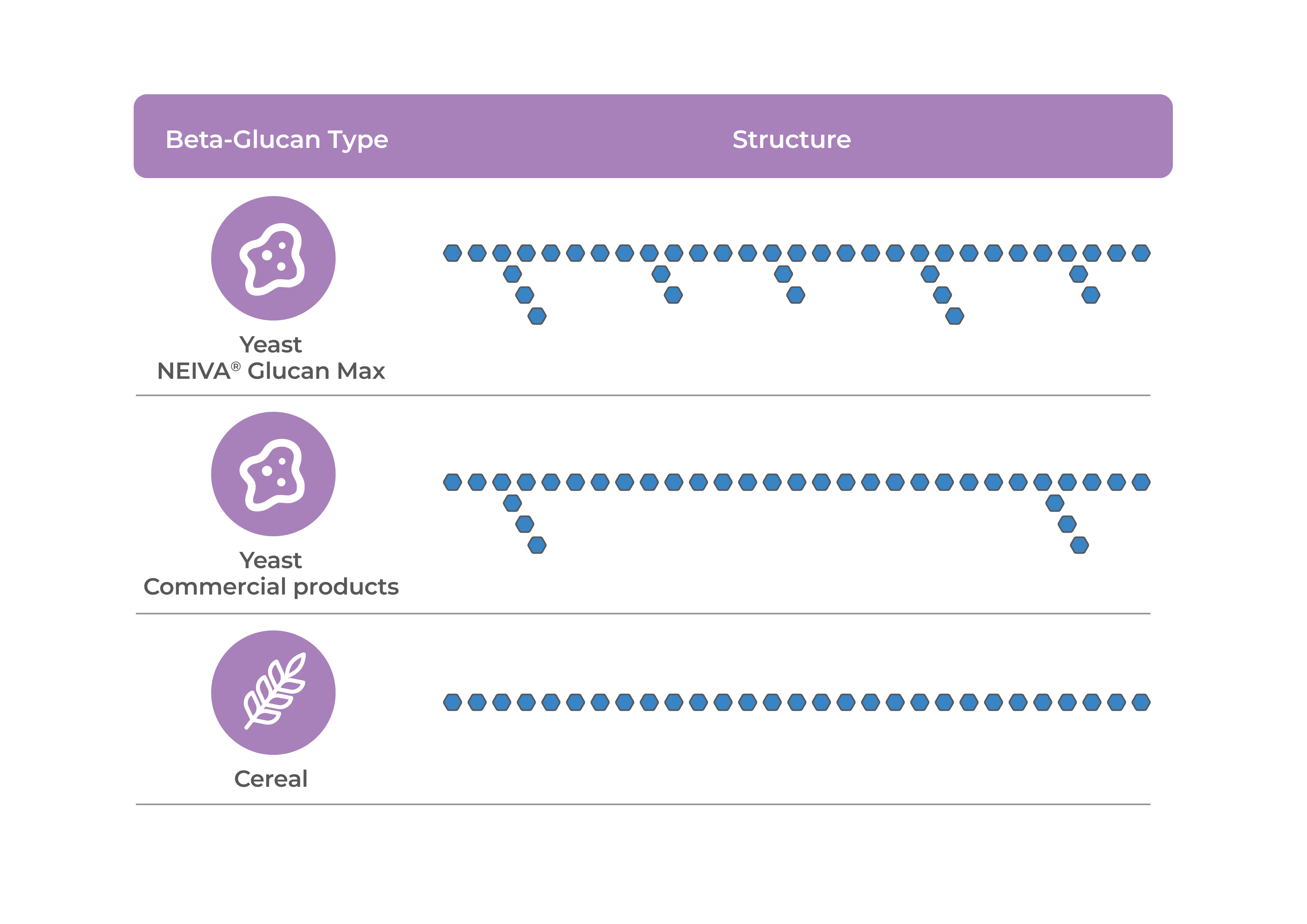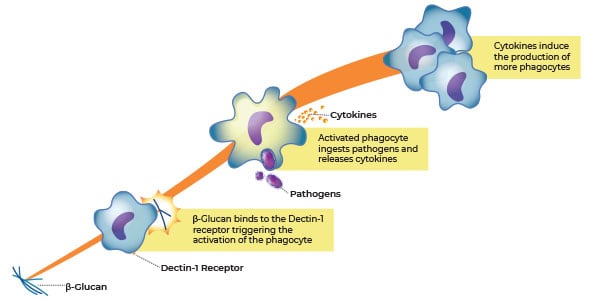Beta-glucans are naturally occurring polysaccharides found in yeast, fungi, cereals and algae.
These compounds have been linked to a wide range of health benefits, including immune support, metabolic health improvements, wound healing and even potential cancer-fighting properties.¹ While beta-glucans from different sources may vary in their specific benefits, yeast-derived beta-glucans have gained particular attention for their potent ability to modulate and strengthen the immune system.
What sets yeast beta-glucans apart from those derived from other sources, like cereals, is their unique and complex structure which contributes significantly to the immune-enhancing properties they can offer.
Structural differences: Yeast vs. cereal beta-glucans
Although both yeast and cereal beta-glucans consist of β-(1,3)-linked glucose units, they differ in structure and functionality, which impacts their health benefits.
- Yeast beta-glucans These feature β-(1,3)-linkages with branching β-(1,6)-linkages, making them insoluble in water. This structural complexity enhances their interaction with immune receptors, making them especially effective at stimulating immune responses.¹
- Cereal beta-glucans These beta-glucans are primarily composed of linear β-(1,3)- and/or β-(1,4)-linkages, which make them water-soluble. This makes them more beneficial for managing cholesterol and blood sugar levels but limits their immune-supporting capabilities.²

Immune benefits
Yeast beta-glucans have been evaluated for safety by the FDA and EFSA and are considered Generally Recognized As Safe (GRAS). The linear structure of cereal beta-glucans is better suited for metabolic applications, such as cholesterol reduction and blood glucose management. However, when it comes to enhanced immune health support, yeast beta-glucans are the preferred choice.³
The reason for this lies in their unique and complex structure, especially their branching side chains, which makes them more effective at interacting with immune receptors, which are crucial for initiating a strong immune response.⁴ This triggers the activation of various immune cells, including macrophages and neutrophils, which are vital for defending the body against pathogens.
While cereal beta-glucans are beneficial for metabolic health, they lack the complexity required for robust immune activation. The linear structure of cereal-derived beta-glucans limits their immune-enhancing effects, which is why yeast beta-glucans, thanks to their branched structure, can be preferred for supporting immune function.³
Another benefit of yeast-beta glucans over their cereal counterparts is that their high molecular weight and insoluble nature play a role in their bioactivity in supporting immune health.⁴
This is possibly due to their resistance to degradation in the digestive tract, potentially allowing them to remain partially intact as they transit through the digestive system, retaining their functional properties.
The immune-enhancing mechanism of yeast beta-glucans
Yeast beta-glucans work by binding to specific receptors on immune cells, such as Dectin-1 and Toll-like receptor 2 (TLR2). This interaction triggers a cascade of immune responses. Their branched β-(1,3)- β-(1,6)-structure enhances receptor recognition, effectively activating immune cells, such as macrophages.
These in turn produce cytokines, which are signalling molecules that help coordinate the immune response. One of the key cytokines activated is interleukin-2 (IL-2), which plays a vital role in immune cell communication and activation.⁵

The immunostimulatory effects of yeast beta-glucans extend beyond mere pathogen defence. These compounds can enhance the effectiveness of vaccines by promoting higher antibody production, improving the body’s ability to fight off infections. Additionally, yeast beta-glucans aid in wound healing by stimulating angiogenesis (the formation of new blood vessels) and reducing inflammation, further supporting immune function.
This makes yeast beta-glucans an incredibly versatile tool for strengthening overall health by contributing to both innate and adaptive immunity and providing protection against a range of illnesses, from the common cold to more severe infections.
Scientific validation: Yeast beta-glucans in action
Numerous studies support the immune-enhancing benefits of yeast beta-glucans, demonstrating their positive effects on immune function. These scientifically validated mechanisms highlight the comprehensive immune benefits of yeast beta-glucans, cementing their role in supporting overall health and disease prevention. For instance:⁶
- Phagocytosis Studies have shown that yeast beta-glucans enhance the activity of monocytes, leukocytes, and macrophages by binding to the specific receptors on the surface of these immune cells, thereby stimulating phagocytosis and improving their ability to identify and eliminate pathogens.⁶ This enhanced phagocytic activity supports the body’s rapid response to infections and promotes faster pathogen clearance.
- Cytokine production Yeast beta-glucans have been shown to significantly stimulate the production of cytokines, key signalling molecules that help coordinate immune responses.⁶ One of the most important cytokines activated by beta-glucans is interleukin-2 (IL-2), which enables communication between immune cells, fostering a more coordinated and powerful immune response. Beyond IL-2, other cytokines such as tumour necrosis factor (TNF-α) and interleukins like IL-6 and IL-12 are also upregulated by beta-glucans. These cytokines help recruit more immune cells to the site of infection, amplifying the immune response and increasing the overall effectiveness of the body’s defence mechanisms.
- Antibody production Studies have highlighted how yeast beta-glucans increase antibody production.⁶ These antibodies play a crucial role in neutralizing pathogens, marking them for destruction and preventing reinfection. By boosting antibody production, yeast beta-glucans help enhance the body’s ability to recognize and defend against pathogens more efficiently. This increased antibody production is also particularly beneficial in improving the effectiveness of vaccinations, as it helps the immune system generate a stronger, longer-lasting immune response to the pathogen targeted by the vaccine.
These findings provide compelling evidence of the critical role yeast beta-glucans play in enhancing immune function and overall health. Their impact on both the innate and adaptive immune systems ensures that the body remains well-equipped to handle various threats.
Yeast beta-glucan applications in health
Yeast beta-glucans are increasingly being recognized for their health benefits beyond just immune support. Their ability to modulate immune responses has led to their incorporation into various health supplements aimed at improving overall immunity, enhancing disease resistance, and supporting recovery. Additionally, their role in enhancing vaccine efficacy has sparked interest in their potential use in immunization programs.
A robust immune solution
Yeast beta-glucans are an exceptional solution for supporting immune health. Their unique structural features, coupled with their advanced production processes, make them highly effective at modulating immune function. Unlike other forms of beta-glucans, yeast-derived beta-glucans offer a combination of high bioactivity, immune-enhancing benefits, and scientifically validated mechanisms of action.
One such product, NEIVA® Glucan Max by Ohly, stands out as a premium yeast beta-glucan that delivers superior immune support thanks to its optimized branching structure and purity. High-quality yeast beta-glucans like NEIVA® Glucan Max offer sustained benefits, making them an excellent choice for individuals seeking reliable immune health support.
References
- Bobade, H.; et al.(2021). Beta-glucan. Nutraceuticals and Health Care. 343–358.
- Lante, A.; et al. (2023). Beta-Glucans of Cereals: Functional and Technological Properties. Nutrients. vol. 15.
- Vetvicka, V.; et al. (2007). Physiological effects of different types of β-Glucan. Biomed Pap Med Fac Univ Palacky Olomouc Czech Repub. 151, 225–231.
- Han, B.; et al. (2020). Structure-Functional Activity Relationship of β-Glucans From the Perspective of Immunomodulation: A Mini-Review. Front Immunol. 11:658.
- Stier, H.; et al. (2014). Immune-modulatory effects of dietary Yeast Beta-1,3/1,6-D-glucan. Nutrition Journal, 12-38.
- Vetvicka, V.; et al. (2014). Comparison of immunological effects of commercially available β-glucans. Applied Scientific Reports. 1(1):2.



